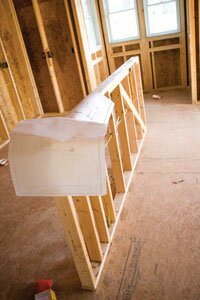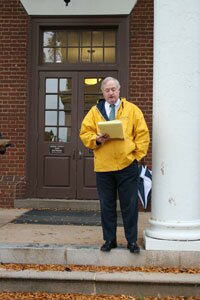COVER- Lien on me: How one high rolling firm's troubles trickle down

PHOTO BY JEN FARIELLO
In September, Church Hill Homes announced that a Richmond-based firm was swooping in to purchase nearly a dozen of its properties in the massive green development off Rio Road called Belvedere. A month later, more than a dozen of Church Hill's other properties fell into foreclosure.
Even with that evidence that Church Hill has been struggling for months, the amount of economic pain that has trickled down from its failure comes as a rude shock: over a dozen subcontractors– many of them small, locally owned businesses– claim they are owed hundreds of thousands of dollars. It's money that they say they desperately need, but which they believe they will never see.
"You build trust up, and all of a sudden, they take that trust and misuse it, abuse it," says Ricky Shifflett, who recently dipped into savings to keep his employees from getting pink slips after Church Hill failed to pay the $35,000 he was expecting for laying tile.
The Church Hill collapse also struck Brian Samuels particularly hard. Based in the Shenandoah Valley, Samuels operates a house-framing firm that employed at least 25 people until June, when he was working almost solely for Church Hill. Now, he says, Church Hill owes him $140,000, and he's had to let go of all but eight employees.
Samuels says laying off employees– particularly those who'd been with him for years– was painful.
"I know there's not much other work out there," he says, mentioning one former employee in particular. "He worked for me for five years," he says. "I hated to let him go."
Samuels remains in contact with that employee– who declined to be interviewed by the Hook– and says he hopes to be able to re-hire him and the others if the housing market improves.
Trouble brewing
"It's a handshake to me, that's just the way I do business," says Wayne McDaniel, who had never filed a lien against a property in his 25 years in the painting business. "When I finish the job," he says, "they pay me."
Except this time, they didn't.
"It makes me sick to think about it," says McDaniel, whose says his company, McDaniel Custom Painting, is owed, $117,000 by Church Hill.
In June, Church Hill notified the "subs," as tradespeople typically refer to subcontractors, about the serious financial problems it was facing– and informed them that it would be unable to pay, at least in the foreseeable future.
That's when a wave of subs headed to the courthouse to see if they could force payment on any of their work by filing documents called mechanics' liens.
Virginia law attempts to ensure that mechanics, i.e. anyone who works on a structure, get paid by allowing mechanics to attach a lien to any property where the mechanic has been stiffed. Such liens can block the sale of a property until lien holders have been paid.
On the second floor of the Albemarle County Courthouse, the breadth of the Church Hill devastation is apparent. There, last week, were 129 liens against Church Hill.
In hindsight, subcontractors concede they might have known trouble was brewing as early as December last year when Church Hill's owners mentioned money woes and asked each sub to accept a payment plan for work that had already been completed. That's when Church Hill allegedly promised that all future work would be paid in full.
"I shoulda quit right then, but I was in too deep," says McDaniel, who claims he was already owed $16,000 by that point, and accepted $3,500 with Church Hill's promise that they'd pay the remaining balance in monthly installments.
Over the next six months, he says, he'd often have 10 or 11 of his 19 employees just on Church Hill work, racking up additional invoices. Shifflett and Samuels accepted similar deals.
"I thought it was a minor hiccup," says Samuels, who in December agreed to accept $500 a month on the $12,000 balance Church Hill owed. Then in June, he recalls, "Out of the blue, there was no check, no work, nothing."
Never again
Shifflett says he believes Church Hill took advantage of him and the other subs who'd worked loyally for them in the past, and that by convincing them that they'd make payments, they deprived them of taking timely action to collect on the debt.
"If you know you're in a financial crisis, you can't keep leading people on and getting free work out of them," he says.
"I think it's dirty the way they did people," says Samuels.
But Church Hill's co-owners, Josh Goldschmidt and Jamie Spence, deny there was any intentional manipulation or malice. Goldschmidt says the December meetings at which he and Spence requested payment plans were held with the best interests of all parties involved.
"We thought we were improving everybody's position," says Goldschmidt. "When we realized we weren't, we stopped."
Spence says in June, he instructed subcontractors to file liens against Church Hill so that they'd have a better chance to collect. "We've tried to be up front," he says. "I can't say we didn't make some bad business decisions, but as far as trying to stick it those guys, that was not our intent."
While several other lien holders did not return the Hook's repeated calls, at least one says he believes Goldschmidt and Spence when they say they were acting in good faith.
"Church Hill Homes has been 100 percent up front with us," says Walter Slawski of Synergistic Contracting Services, who insists that in his December meeting with Goldschmidt and Spence, "they explained the process very clearly" and moreover, he says, "everything they've said has happened."
Slawski declined to reveal the exact amount his company is owed for work completing trim, siding and flooring, but lien records in the Albemarle County Courthouse suggest it's at least $70,000. Slawski says he's "not ignoring the fact that they owe us money," but he believes that "because they've been so honest to date" he'll get paid eventually. He's also philosophical about the situation.
"Everybody is taking a hit in this economy," he says. "When times were good, they supported us, we kept busy, made money. It stinks that the profits that we made are gone. I feel badly about the whole thing, across the board."
Slawski says his company is continuing to do work for Eagle Construction, the Richmond-based firm that bought some of Church Hill's Belvedere properties and hired Goldschmidt and Spence as employees.
But McDaniel says he won't be so forgiving.
"I'd never work for those guys again as long as I live," he says.
The highest bidder
Sorting out Church Hill's financial fiasco won't be quick or easy, a fact that was apparent on October 17 on the front steps of the Albemarle County Circuit Court. Under a gray sky and sporadic drizzle, about a dozen people milled for what's become all too common in recent months: a foreclosure auction.
As the trustee for seven of Church Hill's Albemarle County properties, Richmond attorney Paul Bliley read off the addresses and asked for bids. With the exception of a empty lot in Wickham Pond, a new development near Crozet, the only bidder was the loan holder, Union Bank and Trust. The Bank ending up buying back all seven properties– including three houses in Belvedere– for $1.68 million. (When two bidders bid one Wickham Pond lot up to $10,000, a representative for the bank quickly quashed that effort with an $80,000 bid.)
Those seven appear to be just the tip of the Church Hill iceburg. That same day, Union Bank acquired four Church Hill lots in Fluvanna, and a variety of properties will be foreclosed by Union and other banks in upcoming weeks.
"I haven't seen anything on this scale since the early 1990s," Bliley says, "during the savings and loan crisis."
And the number of liens on the Church Hill properties is complicating the bank's ability to put the properties back on the market, says Union Bank rep Dave Clelland, who acquired Church Hill's assets at the auction, and says he wasn't surprised no one else bid on most of the properties.
"Whenever you have to foreclose with a 'subject to...' filed or unfiled mechanics liens," Clelland explains, "people aren't going to take that risk."
According to real estate attorney Cheri Lewis, who is representing two lien holders whose identities she would not reveal, a cascading legal nightmare could unfold.
"The number of claims and properties that this affects, and the number of parties that it's affecting, is extraordinary," says Lewis. "People can't tell whose liens are valid."
Lewis says that anyone who purchases such a property could suddenly discover the property has been foreclosed on a second time by lienholders seeking to satisfy the debt. New lienholders can appear even after the foreclosure, Lewis says, since the law gives contractors up to six months after work is completed to make a claim.
But what if mechanics didn't know the intricacies of the law?
Uncollectable liens?
Union Bank's Clelland says Union is now working with a title company to sort through the liens against Church Hill in an attempt to clear the properties' titles in order to sell them more easily. If the title company rules that some of the liens aren't valid, those lienholders can sue– but success in court is far from assured and depends on a court agreeing that their claim is valid.
Why wouldn't a lien be valid?
Shifflett, McDaniel and Samuels now believe its unlikely they'll ever get paid by Church Hill, despite having filed at least 15 liens between them. While the goal of such liens is to guarantee payment, the fine print of Virginia law caught all three men off guard.
Legal experts say that in order for a lien to be valid, a contractor must file notice with a "lien agent" within 30 days of beginning work. McDaniel, Shifflett and Samuels say they didn't do that because they didn't know it was required.
Attorney Lewis says that Virginia lien law has always attempted to put mechanics first in line– even placing such liens ahead of bank mortgages when properties are sold. However, Lewis says the law was tightened in the early 1990s to prevent frivolous liens, and the new procedure clearly caught local subcontractors off guard.
"It's really too bad," says Lewis. "It's not a procedure people are familiar with because they don't typically have to file liens in this area."
The situation will become further muddled, says Lewis, if Church Hill declares bankruptcy. Spence says that hasn't happened yet, but neither he nor Goldschmidt will rule out the possibility.
If Church Hill does eventually declare bankruptcy, the properties still in Church Hill's name will be auctioned off and then used to satisfy secured debts– like those held by remaining holders of valid mechanics liens, whose claims state law ranks higher than the bank's.
Stonehaus not scared
It's a sticky mess, but Church Hill's woes won't stop progress, developers say, at one of this area's most prominent new communities: Belvedere.
"Belvedere is a huge priority," says Frank Stoner, whose Stonehaus Development Corporation has tried to make Belvedere a showplace of sustainable development.
"Do we have funding challenges? Yeah," says Stoner. "But we're committed to trying to work through those, keep the development moving forward."
Even as Stoner admits the company had to cut about 40 to 50 percent of staff (about 10 people) in recent weeks, Stoner's Stonehaus partner, Bob Hauser, speaks confidently that Belvedere will eventually fulfill its promise as an eco-friendly mixed-use development of more than 700 homes.
"Belvedere is slow right now," says Hauser, mentioning the national corporations going out of business and the generally tumultuous economy. "None of that is good for Belvedere, but it will be fine long term," says Hauser.
Hauser contends that the development's "core values" and proximity to town will keep it in demand as the economy improves. "Belvedere," he says, "is less about keeping up with the Joneses and more about living a balanced life with your family."
That's what Kate White and Brett Harris are counting on. Belvedere's first family, White and Harris and their two children moved into their Belvedere house in August as the neighborhood's first and only residents, but they are no longer alone– at least one other family has since moved in, and close to two dozen other houses are either finished or are well into the construction phase.
Still, strolling through the neighborhood on a fall day, it's clear Belvedere has a long way to go. Great swaths of red dirt still line the main road, where the commercial portion of the development is slated to be built, and although grass is now growing on the "village square" where community activities will one day be held, the vision of Belvedere as a thriving community remains just that– a vision.
Whose warranty?
Shifflett says he's particularly worried that Church Hill's woes will trickle down even to the owners of Church Hill houses– people like White and Harris, who purchased Church Hill houses in the last year.
"Who's going to warranty their work?" he wonders. "If something goes wrong, they don't have anything to fall back on."
Goldschmidt acknowledges the warranty issue is uncharted territory.
"We're doing the best we can," he says. "It's definitely very challenging."
But homeowner Harris says he's not worried.
"Fundamentally, I have far less concern because I'm convinced of the quality of the house," says Harris, who professes an ability to handle minor home repairs himself. He notes that a homebuilder's warranty covers problems with the structural integrity of the house and that things like heating and cooling systems and appliances have their own separate warranties from manufacturers. He also notes that Goldschmidt has talked to him about the warranty issue and has encouraged Harris and White to tell him about any problems that arise with the house so that Goldschmidt and Spence can attempt to address it.
White says she remains undaunted by Church Hill's problems, and she notes that her own house required the clearing of 18 mechanics liens before she and Harris closed on July 31. She's steadfast in her belief that one day– if a bit further in the future than she had originally hoped– Belvedere will live up to its promise.
"Two houses are under contract," she notes. "Belvedere still remains the shining star, the development project that is continuing to get buyers."
Hauser, who in addition to co-owning Stonehaus owns Hauser Homes, the other originial Belvedere builder, says he, too, remains upbeat although he admits Church Hill's woes have caused some "collateral damage" for Hauser. Like Stonehaus, Hauser has also cut its workforce in half– to about 12– since mid-2007.
He says despite Church Hill's trouble, he's happy Goldschmidt and Spence will remain involved in Belvedere working as employees of Eagle Construction.
"I hope they'll enjoy success," he says of Eagle, "and want to buy more lots."
But for Shifflett, McDaniel and Samuels, the future of Belvedere is of far less interest than the future of their own small companies, and they just hope to recoup some of the money from their Church Hill work.
"Do I expect to see any money? I have no idea," says Shifflett. "If I can get $10,000 out of it, I'll be really lucky."
"Getting hit like that, with the economy falling apart," adds McDaniels, "it's like double jeopardy."

In spite of Church Hill's financial woes and the slow down of the housing market in general, Kate White and Bret Harris remain upbeat about the future of Belvedere.
FILE PHOTO BY JEN FARIELLO

Church Hill's holdings in the Carter's View development off Ridge Street remain in limbo, according to Spence, who says the bank has neither foreclosed on the properties, including these three houses, nor has it given Church Hill permission to finish the work.
PHOTO BY WILL WALKER

Wayne McDaniels, of McDaniels Custom Painting, is struggling to make it after Church Hill failed to pay him for work he and his 19-men crew completed. "I try not to dwell on it as much as I was," says McDaniels. "It was stressing me to the point I almost needed to go to a doctor."
PHOTO BY WILL WALKER

Church Hill scored with Village Place in 2006 and 2007 and established the demand for craftsman-style houses like these. After selling all of their Village Place stock, even in an increasingly down market, Spence and Goldschmidt say they believed they could achieve similar success in other developments.
PHOTO BY WILL WALKER

The product Church Hill was building "is exactly what was needed– quality and price point," says Walter Slawski, of Synergistic Contracting Services. "They over extended themselves on real estate side of things."
PHOTO BY WILL WALKER

"I haven't seen anything on this scale since the early 1990s," says Richmond attorney Paul Bliley, "during the savings and loan crisis." As trustee for seven of Church Hill's properties, Bliley read off the addresses and asked for bids at the foreclosure auction on October 17 on the steps of Albemarle County Circuit Court.
PHOTO BY WILL WALKER
#